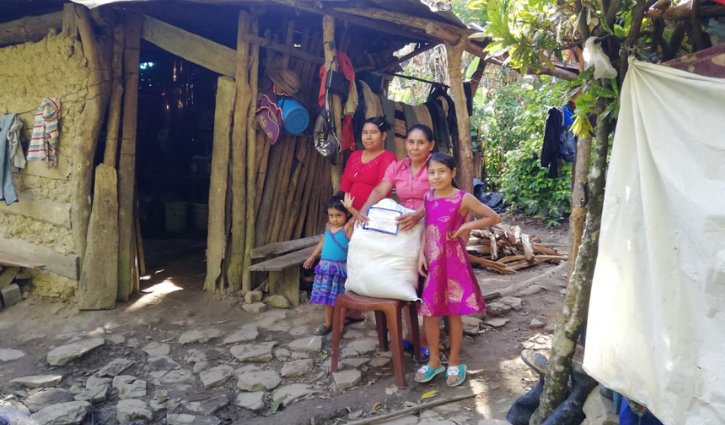Strengthening Climate Resilience with Indigenous Communities in Honduras

Frequent destructive storms and intense floods have upset the way of life for the Maya Chʼortiʼ people, an indigenous group who rely on farming for food and trading in the remote Copán Ruinas region of Honduras.
Historically, Maya Chʼortiʼ farmers plant twice a year, mainly corn and beans. However, unpredictable weather patterns force them to change their planting cycles, often leaving a shorter window of time to grow and to yield a productive harvest. In turn, the smaller harvests leave farmers and their families at a loss. Because they often store as much as they can for nourishment for the rest of the year, they miss the opportunity to sell their surplus crops for income. This also means fewer laborers are hired for each season.
“The work has been very scarce in our community,” said Virginia, an indigenous woman who lives in Copán Ruinas.
The close-knit Maya Chʼortiʼ people are descendants of the Mayans, who passed on their rich history, customs and indigenous language. Many in Copán Ruinas lack Spanish language literacy skills which can prevent members of the indigenous community from participating in mainstream society, including the ability to find or successfully perform other kinds of work.
“The situation in my country is very bad,” said Jacinto, a member of the indigenous community. “The most affected are the poor,” he added.
Major Hurricane Julia and heavy rainfall in 2022 created an even greater financial burden for Maya Chʼortiʼ people. While thousands like Jacinto and Virginia had to begin restoring their farms and land, they also had an immediate need for sustenance. Unfortunately, not only was there a shortage of available food, but the food that they could purchase was sold at an inflated rate, making it unattainable for most rural farm families.
Episcopal Relief & Development, in partnership with the Episcopal Diocese of Honduras through Agencia Anglicana para el Desarrollo de Honduras (AANGLIDESH), provided families with nutritious food.
As a result of this partnership in Copán Ruinas, Episcopal Relief & Development and AANGLIDESH were able to start having climate resilience conversations with the Indigenous community about how the effects of a changing climate, like ongoing drastic flooding and seasons of drought, are impacting their lives.
Building on the strengths of the Maya Chʼortiʼ, like their strong social networks and deep reverence for and understanding of the earth, the community has formed savings and lending groups as a way to cushion themselves from financial shocks created by future climate-related disturbances.
Farmers who take part in the Savings with Education (SwE) groups strengthen their communities and find creative ways to maximize their earning potential. The SwE approach includes management and financial literacy training to help people start and expand small businesses and build collectives that support loans and insurance products.
For the Maya Chʼortiʼ farming community, the SwE initiative has allowed them to focus on education for their young people, including classes to preserve their indigenous language as well as creating economic opportunities for women and youth.
View Episcopal Relief & Development’s 2022 Annual Report for more stories of lasting change.


